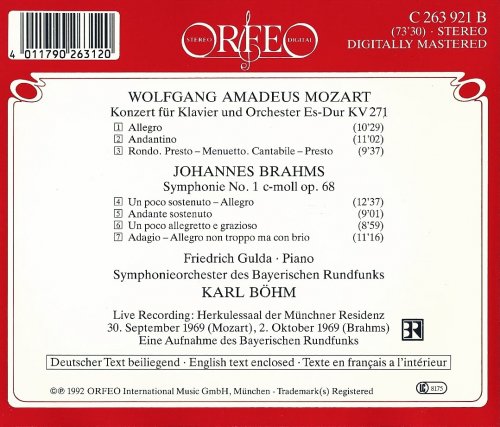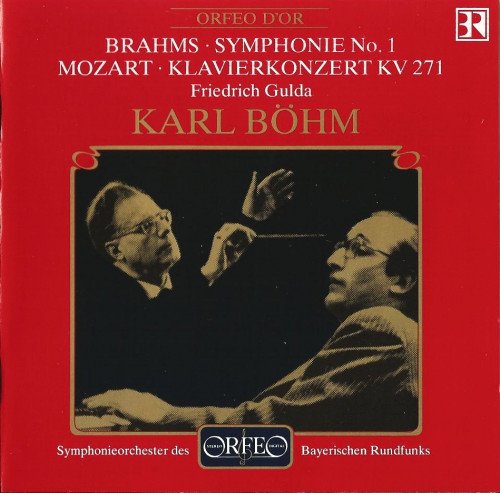
Friedrich Gulda, Karl Böhm - Mozart: Piano Concerto No. 9, Brahms: Symphony No. 1 (1992)
BAND/ARTIST: Friedrich Gulda, Karl Böhm
- Title: Mozart: Piano Concerto No. 9, Brahms: Symphony No. 1
- Year Of Release: 1992
- Label: Orfeo
- Genre: Classical
- Quality: FLAC (image+.cue,log,scans)
- Total Time: 01:13:01
- Total Size: 339 Mb
- WebSite: Album Preview
Tracklist:
Wolfgang Amadeus Mozart (1756-1791)
Piano Concerto No. 9 in E-Flat Major, K. 271, "Jeunehomme"
1. I. Allegro 00:10:29
2. II. Andantino 00:11:02
3. III. Rondo: Presto 00:09:37
Johannes Brahms (1833-1897)
Symphony No. 1 in C Minor, Op. 68
4. I. Un poco sostenuto - Allegro 00:12:37
5. II. Andante sostenuto 00:09:01
6. III. Un poco allegretto e grazioso 00:04:18
7. IV. Adagio - Più andante - Allegro non troppo ma con brio 00:15:57
Performers:
Friedrich Gulda - piano
Symphonieorchester des Bayerischen Rundfunks
Karl Böhm - conductor

Wolfgang Amadeus Mozart (1756-1791)
Piano Concerto No. 9 in E-Flat Major, K. 271, "Jeunehomme"
1. I. Allegro 00:10:29
2. II. Andantino 00:11:02
3. III. Rondo: Presto 00:09:37
Johannes Brahms (1833-1897)
Symphony No. 1 in C Minor, Op. 68
4. I. Un poco sostenuto - Allegro 00:12:37
5. II. Andante sostenuto 00:09:01
6. III. Un poco allegretto e grazioso 00:04:18
7. IV. Adagio - Più andante - Allegro non troppo ma con brio 00:15:57
Performers:
Friedrich Gulda - piano
Symphonieorchester des Bayerischen Rundfunks
Karl Böhm - conductor
As things go cold and crumble into dust, one has to ask if music is little more than a glorified divertimento – brandy of the damned – or if there is some greater resonance to it that enables one to transcend the way of all flesh, however momentarily.
This endeavour is drawn from concerts in late September / early October in 1969 when the world was young. It’s in glorious stereo. Both masterpieces are “Per ardua ad astra” – through hardship to skies of cerulean. In Mozart and Brahms, Uncle Karl can be a God of Death or the Paraclete itself. Here, he’s the latter. This Brahms is Furtwängler ’45 grade – and that’s no lie. It’s more volatile than the Deepwater Horizon. Indeed, there are points in the finale where it’s imperative to stand in response to these cosmological outbursts (say, at 14’10”ff). In K 271, Uncle Karl is assisted no end by Gulda who likewise gives vent to the grandeur and tragedy of this, the first great concerto in history. When the oboe combines with piano in the Andantino (4’31”ff), one is more spirit than flesh. There’s no finer Jeunehomme in circulation. It’s flawless.
It should never be forgotten that you and I, Mozart and Brahms, K 271 and Op. 68, Uncles Karl and Friedrich are unnecessary beings in the scheme of things – and yet here we are at this point of convergence. As Goethe says: “Music of God, why do you seek me out in the dust?” To promote a concert in 1999, Gulda announced his own death in a press release so that the concert at the Vienna Konzerthaus could serve as a resurrection party.
This endeavour is drawn from concerts in late September / early October in 1969 when the world was young. It’s in glorious stereo. Both masterpieces are “Per ardua ad astra” – through hardship to skies of cerulean. In Mozart and Brahms, Uncle Karl can be a God of Death or the Paraclete itself. Here, he’s the latter. This Brahms is Furtwängler ’45 grade – and that’s no lie. It’s more volatile than the Deepwater Horizon. Indeed, there are points in the finale where it’s imperative to stand in response to these cosmological outbursts (say, at 14’10”ff). In K 271, Uncle Karl is assisted no end by Gulda who likewise gives vent to the grandeur and tragedy of this, the first great concerto in history. When the oboe combines with piano in the Andantino (4’31”ff), one is more spirit than flesh. There’s no finer Jeunehomme in circulation. It’s flawless.
It should never be forgotten that you and I, Mozart and Brahms, K 271 and Op. 68, Uncles Karl and Friedrich are unnecessary beings in the scheme of things – and yet here we are at this point of convergence. As Goethe says: “Music of God, why do you seek me out in the dust?” To promote a concert in 1999, Gulda announced his own death in a press release so that the concert at the Vienna Konzerthaus could serve as a resurrection party.

Classical | FLAC / APE | CD-Rip
As a ISRA.CLOUD's PREMIUM member you will have the following benefits:
- Unlimited high speed downloads
- Download directly without waiting time
- Unlimited parallel downloads
- Support for download accelerators
- No advertising
- Resume broken downloads


